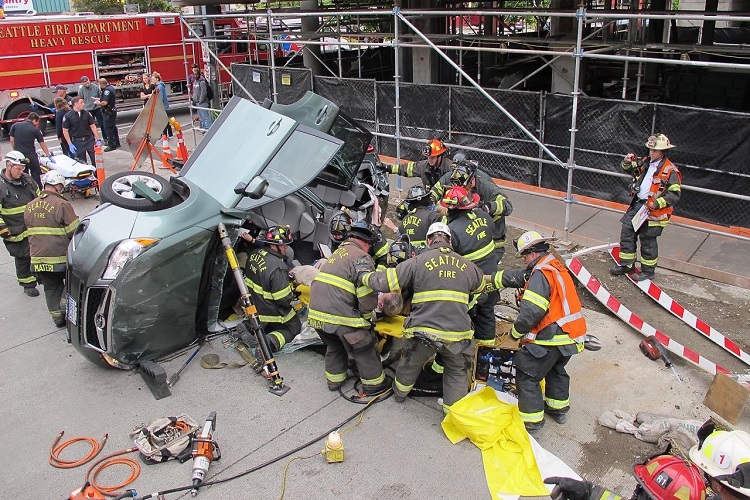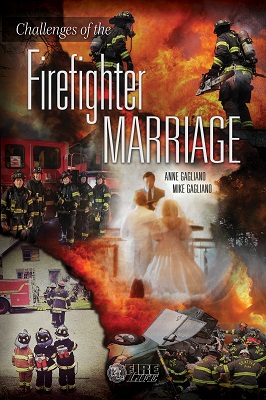

By Anne Gagliano
As a young fire wife, I knew my firefighter witnessed some pretty bad stuff. I realized it had to have an impact; he’s a good man with a kind heart, so how could it not? I remember asking him, “How was your night?” when he’d get home after a 24-hour shift, or later, with the advent cell phone technology, how the shift was going while it was still going: “Not too bad, no big deal, had a small fire, a few aid runs,” was typically all I’d ever get. Very few details of anything impactful were ever relayed to me. So maybe it wasn’t so bad—maybe he never really did see anything all that horrific. The irritability I noticed when he first became a firefighter was probably related to something else—fatigue; the long commute home; or, perhaps, to me.
RELATED: What Every Firefighter’s Spouse Should Know | HERO (to Everybody Except His Wife) | Firefighters: Avoid Burnout with Vacations
But then I would hear them, at firehouse parties and gatherings or on the phone as he chatted with crewmates, the shocking details of stories I was not privy to. Stories that occurred long ago or quite recently, most of which were completely new to me. And if I had known of the incident, the version I was told was vanilla, plain, tame compared to the one I was now hearing. Those I overheard were mostly told with humor, but the dark, gritty kind. Some were softly spoken with incredulity, even horror. And many were relayed in a matter-of-fact tone that was disturbing in their utter lack of any emotion at all.
Despite the way these stories were communicated, I would always think, “Why have I not heard this before? Why am I left out of the loop of such incredible experiences? Why is it that he won’t or can’t tell me how this run made him feel? He obviously likes—even needs—to talk to the guys about these things, but why not me? Am I not trusted, am I no help?” My husband Mike and I are best friends, soul mates, as close and in love as two people can be. So, how can he live with these impactful experiences and not share them with me, first and foremost, above all others? It almost seemed a betrayal, like secrets kept, experiences denied. He had a need that I could not meet. This left me feeling inadequate as a fire spouse and, often, this burning question would arise in my soul: Why am I not enough?
I’ve been a firefighter’s wife for more than three decades now, and it took me a lot of years to figure something out—a simple truth—though one not easily learned. I was wrong to think I was not enough; in fact, I am more than enough. And so are you, fire spouse, if you’re doing some of the following. These simple acts will help your firefighter cope with the inherent trauma of being a first responder, more so than you probably even know.
You are more than enough if you recognize the need. The need for what? The need for healing after trauma has occurred. This begins with understanding what trauma is; it is simply witnessing human suffering. Firefighters are witness to this almost every shift. The most impactful runs of all; anything involving (1) a child number one, and (2) a co-worker. If your firefighter experienced either of these two types of traumatic events, understand that they have very likely been emotionally impacted, whether they realize it or not. However, any aid run can get to any firefighter at any time; they never know which will impact more so than others. It could be a look-alike of a loved one, a location, a sound, a smell, and so on.
I learned to hear it in Mike’s voice over the years; he would go from being soft-spoken to a louder, amped, almost excited quality of voice that was a result of the rush of adrenaline. Agitated, restless, sleepless, grouchy. Angry. These are all common reactions to trauma and have nothing to do with you. Encourage your firefighter to rest. Relax. Sleep. Relish the normalcy of home. Eat small meals to keep up his energy level. Exercise. And, most of all, avoid alcohol or drugs; these will only worsen trauma symptoms that can include feelings of depression, anxiety, isolation, and irritability. It is normal to feel sad or angry. It is normal to continually think about what happened. Don’t be alarmed—your firefighter isn’t mental.
You are more than enough if you don’t force the issue. Sometimes, compelling someone to talk about trauma can re-traumatize. We remember these events in fragments, in sounds, in smells, not in words. This is because adrenaline causes a shift from the prefrontal cortex to the limbic region (or animal brain) for the purposes of fight or flight. Hence, thoughts are temporarily impaired. So, don’t force it, fire spouse; your firefighter just needs time. Let him feel the pain—it’s necessary. And firefighter, don’t feel guilty or ashamed if you’re having a bit of trouble letting go of an incident; you’re only human and it takes time to literally process the event into your thinking parts of the brain. It will fade. You’ll never forget, but you will find peace with those memories.
You are more than enough if you realize it’s not about you. This was probably the toughest lesson of all for me to learn. There were some things Mike experienced that simply were beyond his ability to share with me or my ability to understand because I wasn’t there. How could he tell me things he himself couldn’t quite vocalize? What he truly needed from me was my undying, constant love and support. My presence. My touch. And my willingness to quietly step back and let him talk to whomever was most helpful—i.e., his co-workers, without being hurt or jealous. And if the anger or dark thoughts start to impair daily life, it’s okay to seek professional help. This is normal too, nothing to be ashamed or afraid of.
Trauma is pain and sorrow. It is part of the human condition, and for the firefighter and firefighter spouse, it’s part of the job. It’s tough to put into words what we fire couples must deal with, so I’ll borrow some from the gifted poet William Wordsworth:
We will grieve not, rather find strength in what remains behind; In the primal sympathy which having been must ever be; In the soothing thoughts that spring out of human suffering; In the faith that looks through death, In years that bring the philosophic mind…Thanks to the human heart by which we believe, Thanks to its tenderness, its joys, and fears, To me the meanest flower that blows can give thoughts that do often lie too deep for tears.
Walk through trauma together and you will find peace on the other end. Find joy in each other and in daily life. Know that because you showed up, firefighter, that horrific situation was made better by your presence. And because you stand with him, fire spouse, you are more than enough to help him continue showing up. Have faith that looks through death and be thankful for that tender heart.
 If you’re interested in my book, Challenges of the Firefighter Marriage, check it out HERE
If you’re interested in my book, Challenges of the Firefighter Marriage, check it out HERE
Use code CFM20FL at checkout for 20% off!
Anne Gagliano has been married to Captain Mike Gagliano of the Seattle (WA) Fire Department for 33 years. She and her husband lecture together on building and maintaining a strong marriage.

